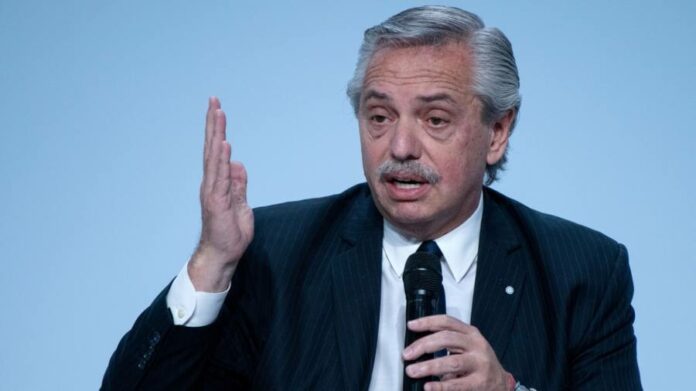Argentina’s President Alberto Fernández has called for the EU to renegotiate a landmark trade deal with South America, saying the agreement is unbalanced and a threat to the car industry in Brazil and Argentina.
“What we have to do is sit down and look at how we can reach an agreement on a more realistic basis,” Fernández told the Financial Times’s Global Boardroom conference.
Asked how long that process might take, he said: “As long as the parties want. It’s like tango. Tango is danced by a couple, you need both people to want to dance tango, otherwise, it’s very difficult.”
The trade deal between the EU and the Mercosur bloc — Argentina, Brazil, Paraguay and Uruguay — was agreed in principle in 2019 after nearly two decades of haggling. But its conclusion has been held up amid European objections to Brazil’s poor record on preserving the Amazon rainforest under the leadership of far-right president Jair Bolsonaro.
The election in October of Luiz Inácio Lula da Silva, who has vowed to preserve the Amazon, as Bolsonaro’s successor sparked hopes that the long-delayed EU-Mercosur deal might win final approval. Xiana Mendéz, Spain’s trade minister, told the FT last month she believed he would back the pact. “It’s a very balanced one,” she said. “We don’t support reopening negotiations.”
But Fernández told the FT conference that the environment “is not the reason that we don’t have the agreement, that’s an excuse”.
“The real reason is that for Brazil and Argentina [as] car producers, the only car producers in South America, that agreement is a problem because it makes things difficult for us if European competition comes to South America,” he said.
At the same time, South American nations faced “a load of obstacles” in selling their agricultural exports to Europe, with countries such as France, Ireland and Poland opposed to ending farm subsidies and allowing competition from Argentina, he added.
“Neither Lula nor I are against the agreement with the European Union,” Fernández explained. “You have to bear in mind what this agreement is like, because this agreement has problems . . . which have to do with market imbalances.”
While arguments continue over the long-stalled trade pact with Europe, Argentina is striking deals with China, its second-biggest trading partner after Brazil. Beijing agreed last month to expand a swap facility with the Argentine central bank to $25bn, helping to bolster the South American country’s meagre foreign reserves.
China has also built a space observation station in the Patagonian province of Neuquén which the Center for Strategic and International Studies think-tank in Washington says operates with little Argentine oversight and could be used for military intelligence-gathering.
Fernández rejected the argument that Argentina needed to choose between the US and China, saying he had no desire to recreate the cold war era. “Argentina has to do what suits Argentina best,” he said. “The United States is very concerned about what China might do in Latin America but China can do . . . exactly the same in Latin America as the US can, it can come and invest.”
Argentina is building a naval base at Ushuaia in southern Patagonia to support vessels patrolling the south Atlantic and Antarctic but Fernández described as “fantasy” news reports that China was involved. “Nothing like this exists,” he said. “In Argentina you can’t have Chinese or American or French military bases . . . because we are a sovereign nation.”
The South American nation faces daunting economic challenges, with inflation nearing 100 per cent a year, access to international financial markets largely cut off after a 2020 default, and exchange controls which have pushed the black market dollar to nearly twice the official level.
Fernández said the Argentine economy was “strange” because despite high inflation and “unpayable” levels of debt, the country also had record levels of foreign investment and exports in the first half of the year, unemployment was low and consumption was growing.
“If you stick with the picture of an inflationary Argentina . . . of an indebted Argentina, you will say that Argentina is in a mess,” Fernández said. “But there are also all these data which indicate sustained growth and enormous potential.”
The solution to the South American nation’s long-running economic woes, he said, was to add value to its commodities. “Argentina must stop being an exporter of raw materials and become an industrial nation.”
Argentina holds presidential and congressional elections next October and polls show Fernández’s Peronist party trailing the conservative opposition. The president has in the past said he would like to run again but his approval ratings are low and he told the FT conference he was “absolutely absorbed” with governing.
His powerful vice-president, Cristina Fernández de Kirchner, said on Tuesday she would not run again after being convicted of corruption, a verdict she plans to appeal against.
“I am not thinking about re-election, believe me,” President Fernández said. “I am thinking about how to solve all these problems [of the country] . . . I want to end my term having sown Argentina with opportunities for the person who succeeds me.”
Additional reporting by Andy Bounds in Brussels






